Luke's Inclusive Message Lesson 1
Mike Ervin

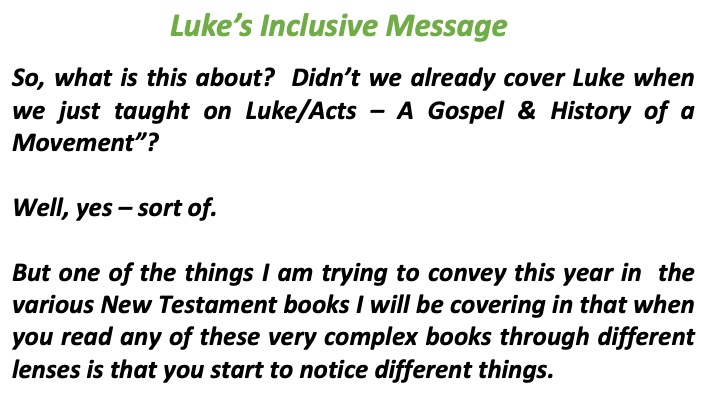
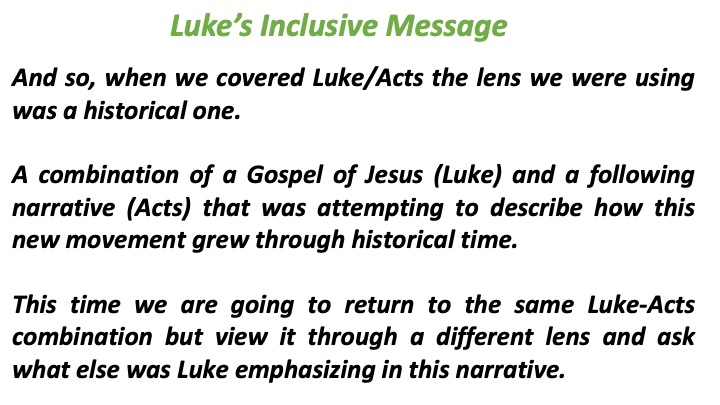
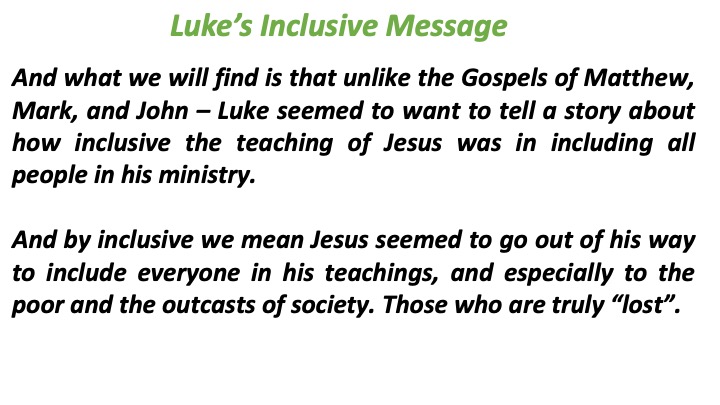
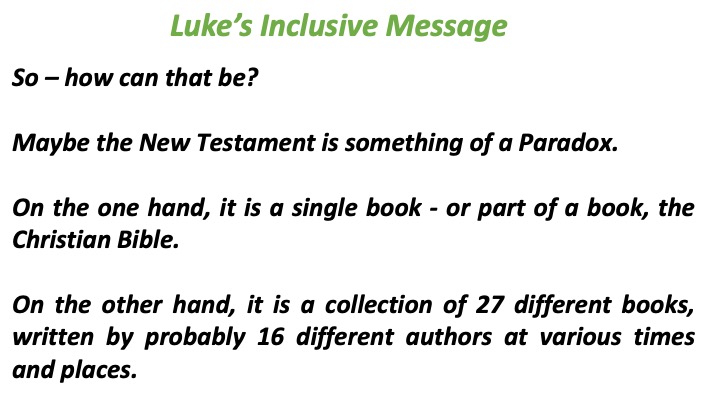
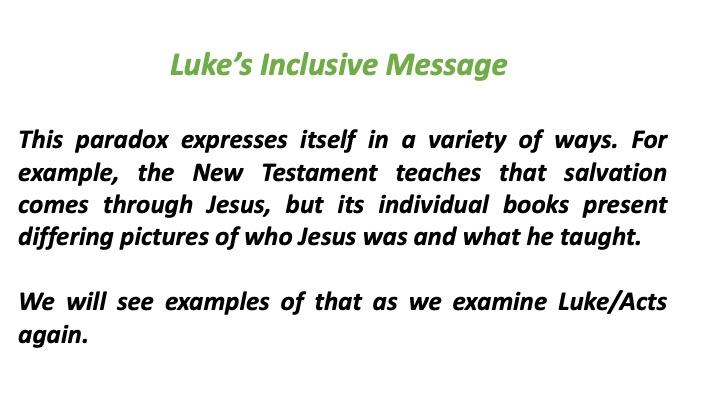
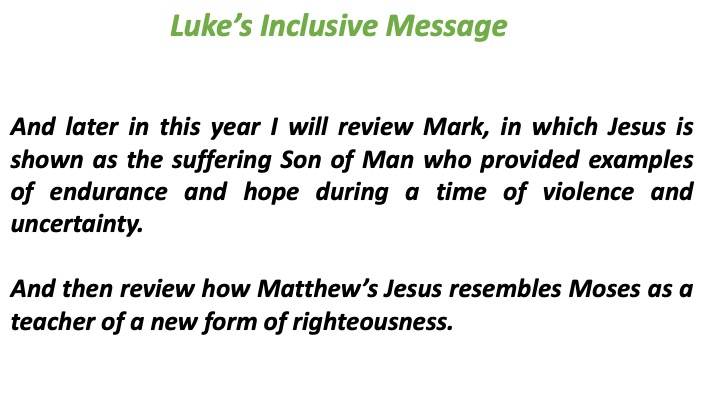
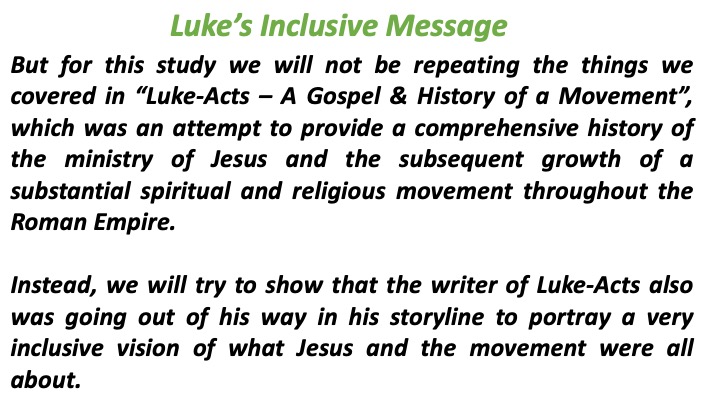
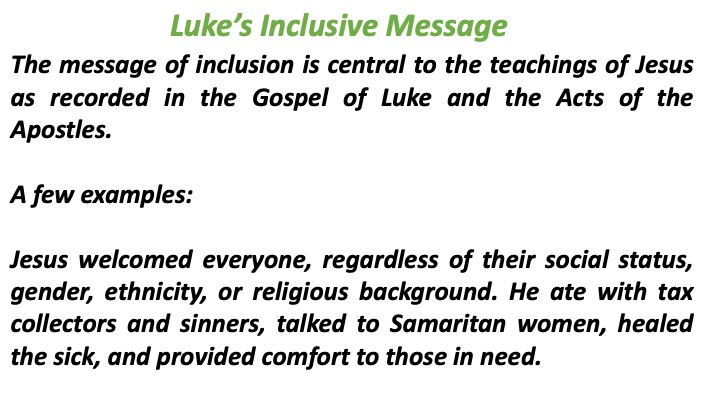
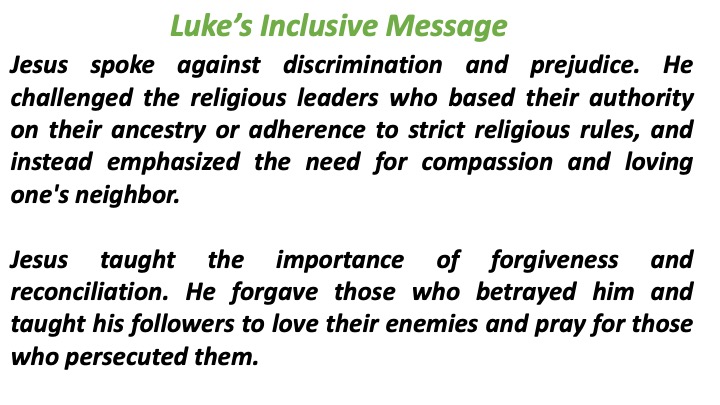
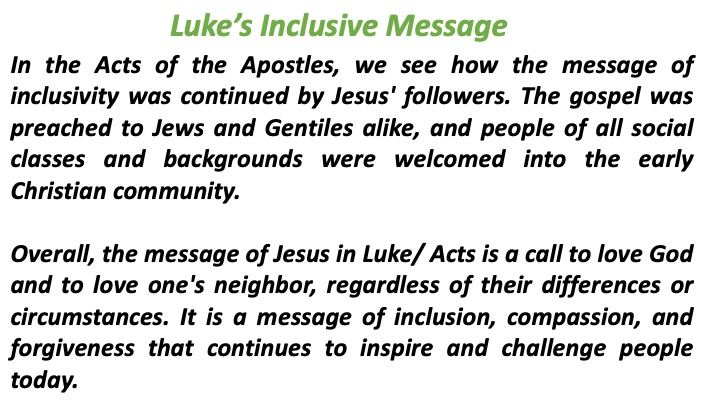
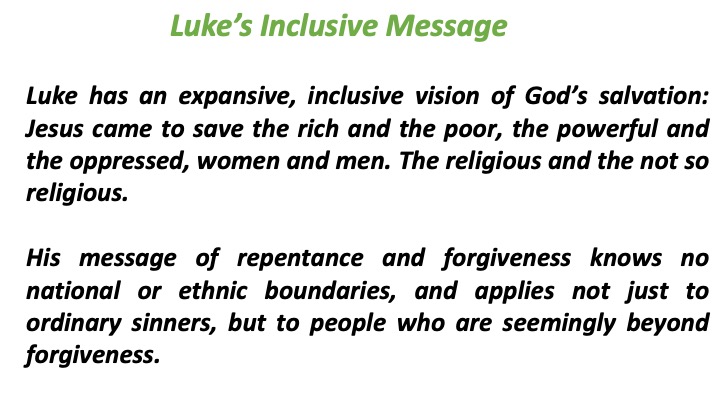
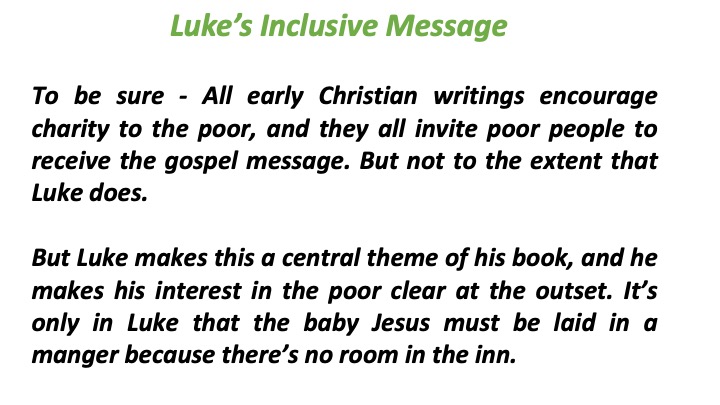
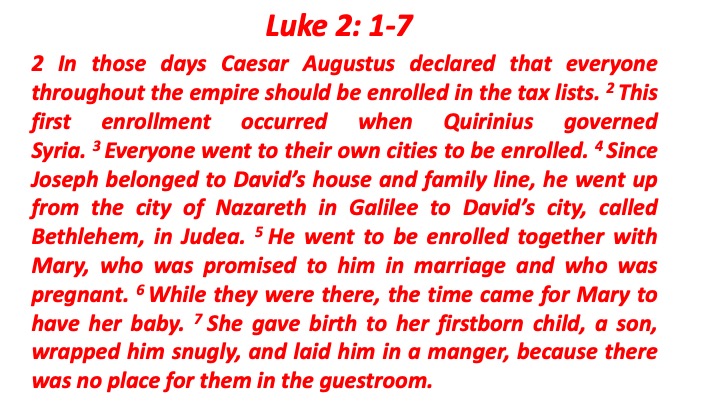
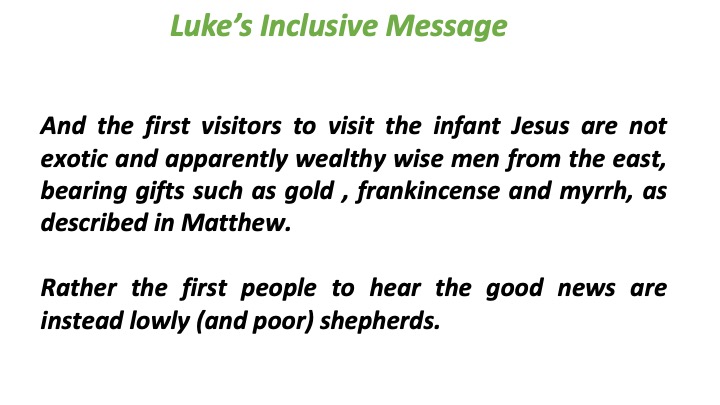
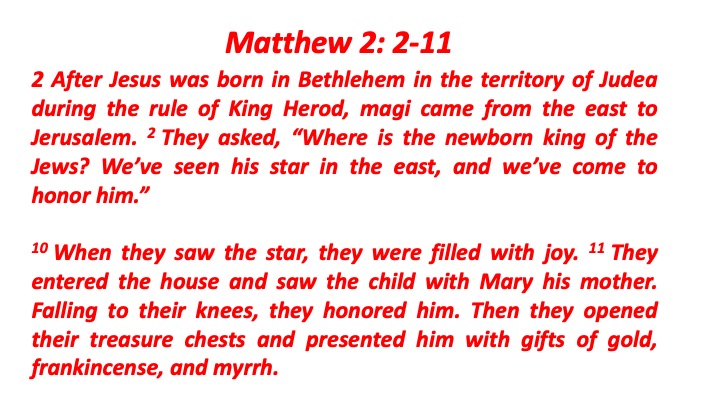
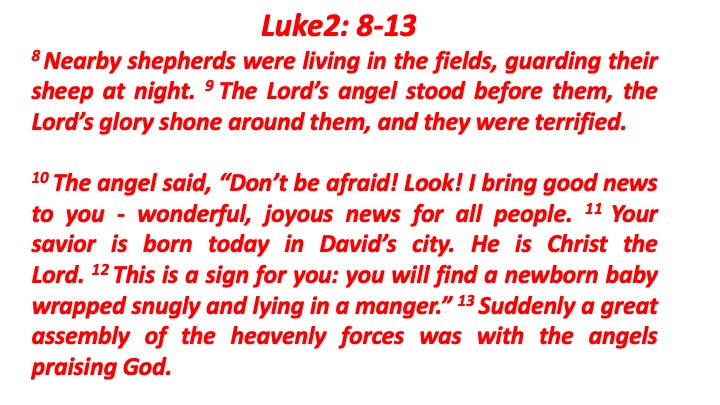
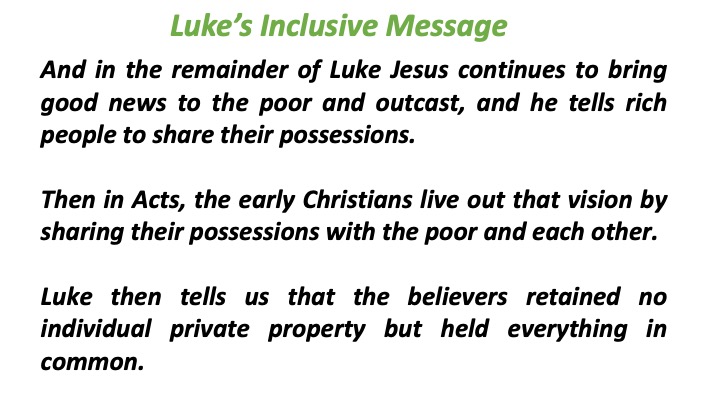
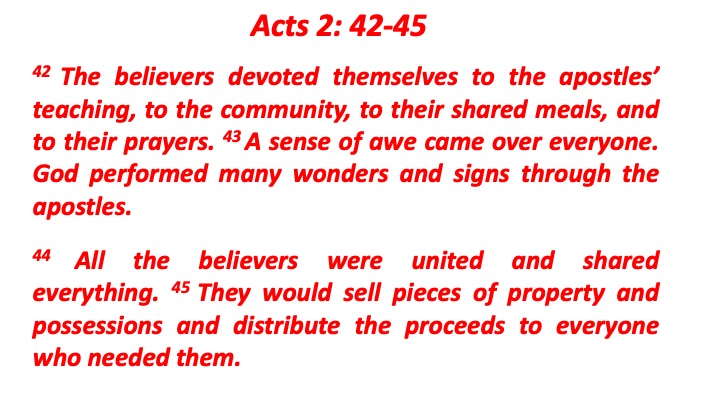
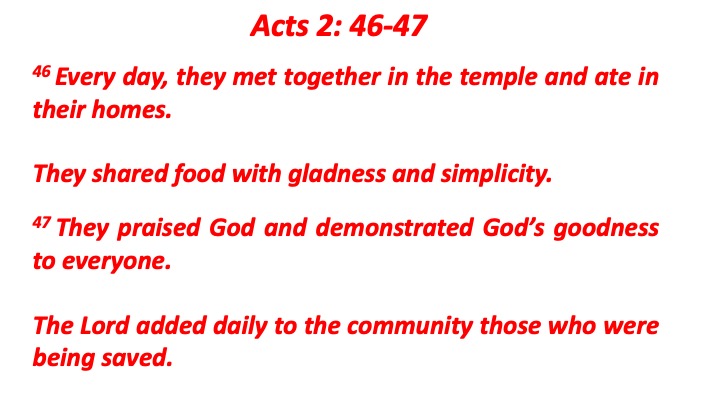
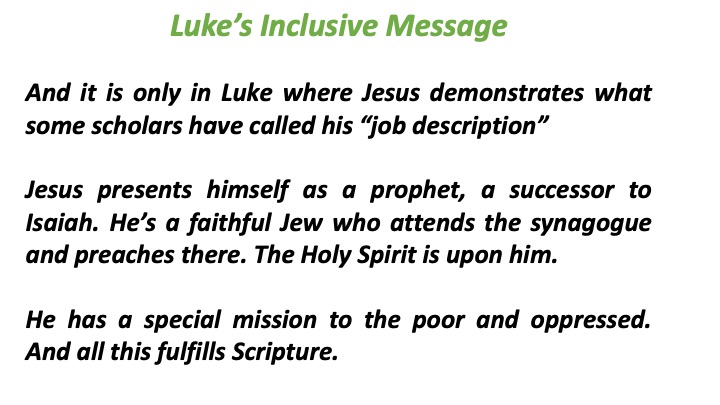
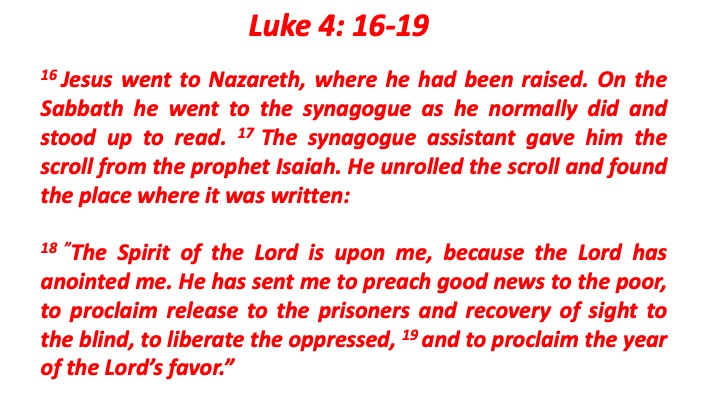
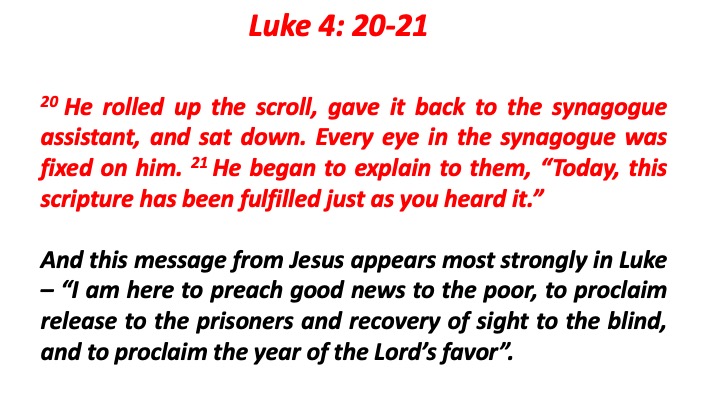
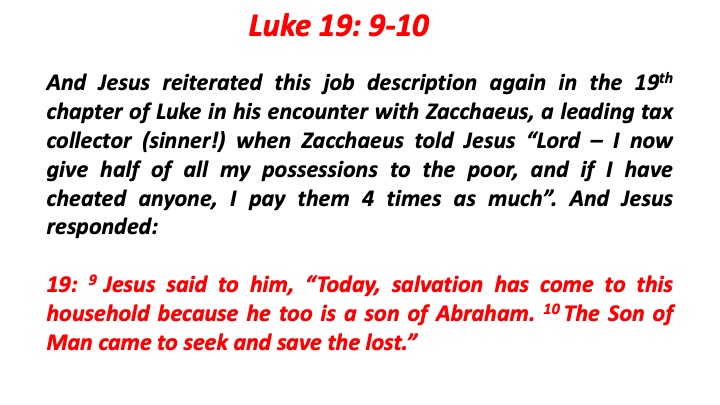
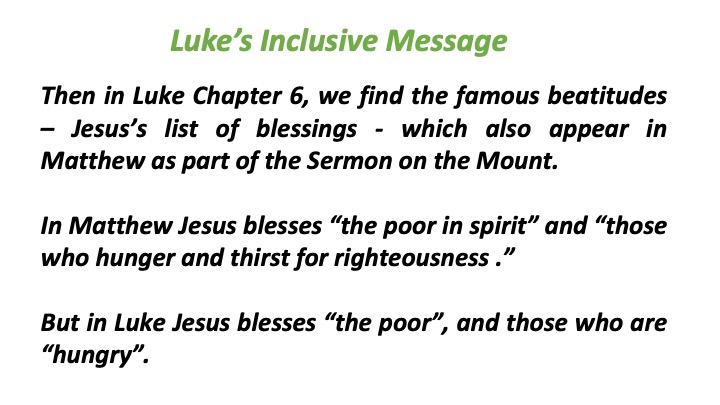
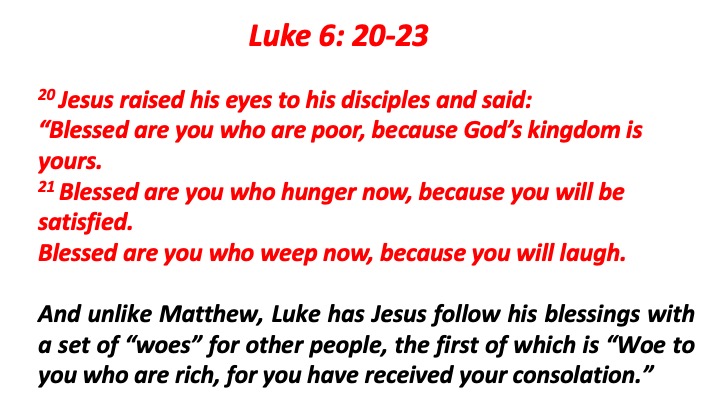
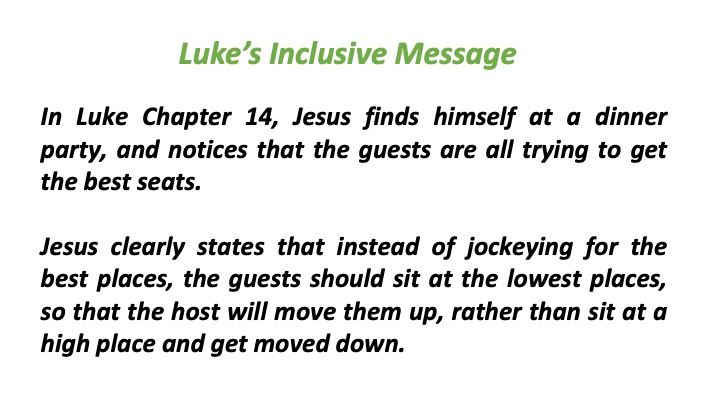
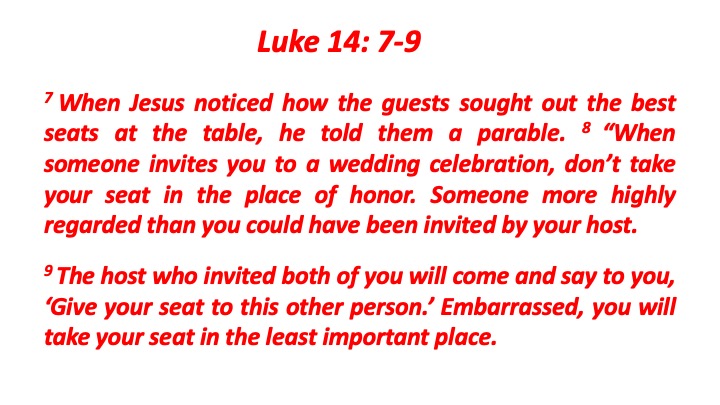
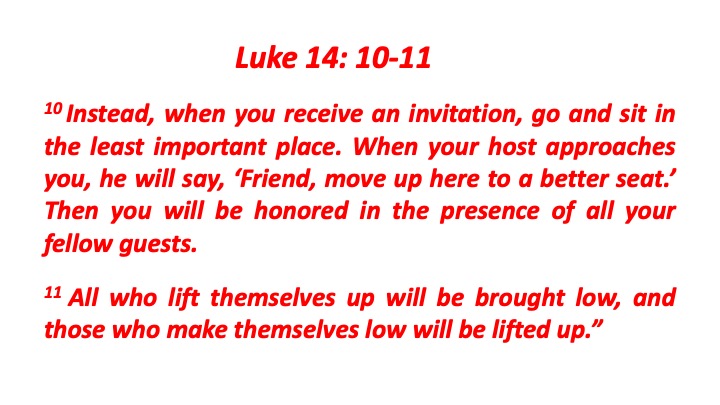
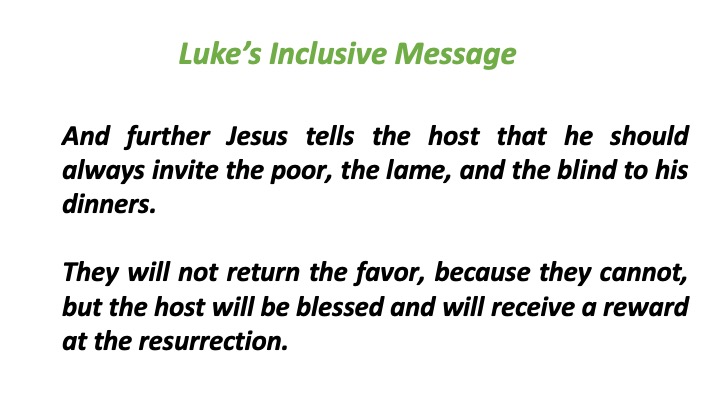
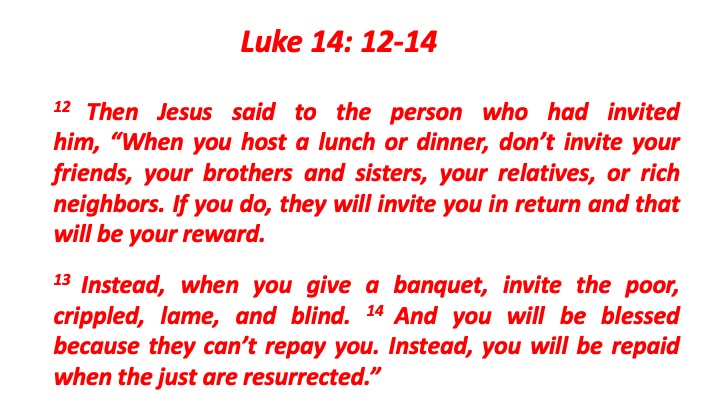
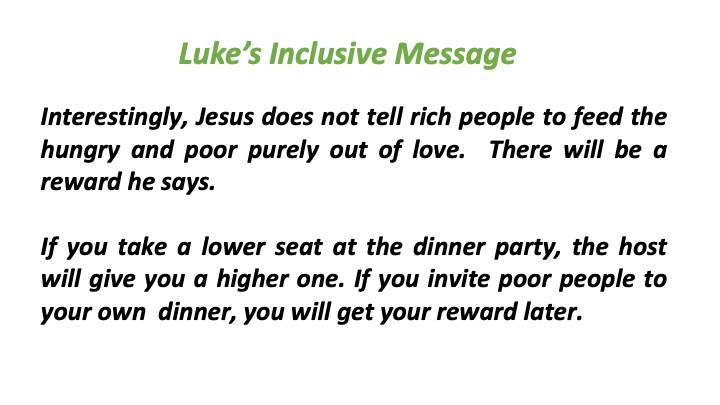
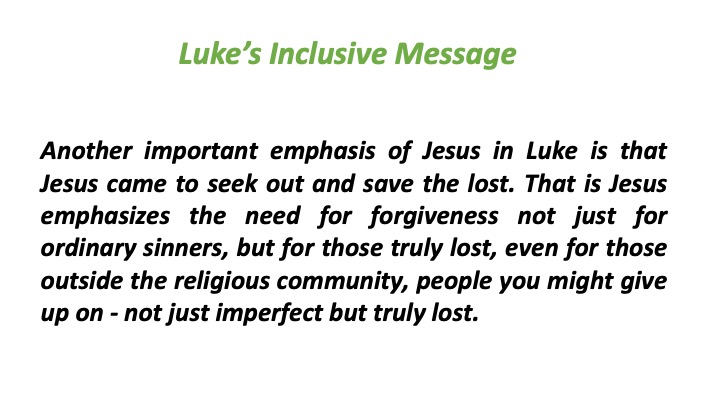
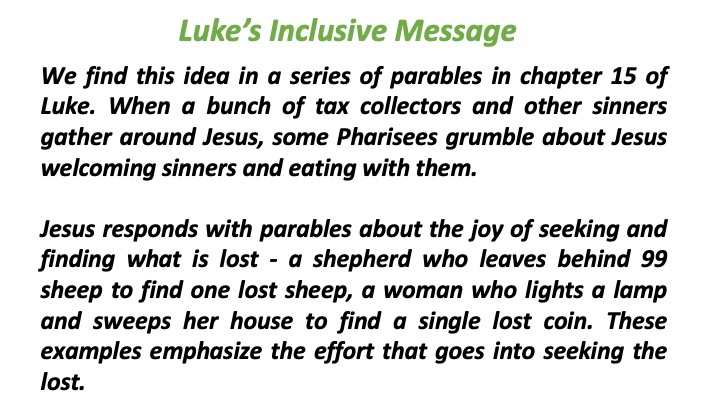
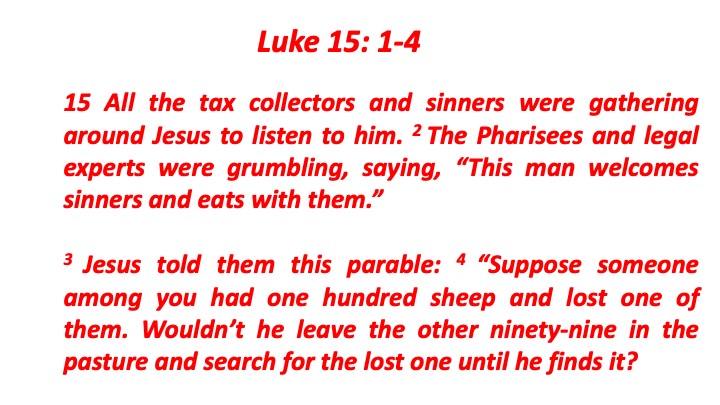
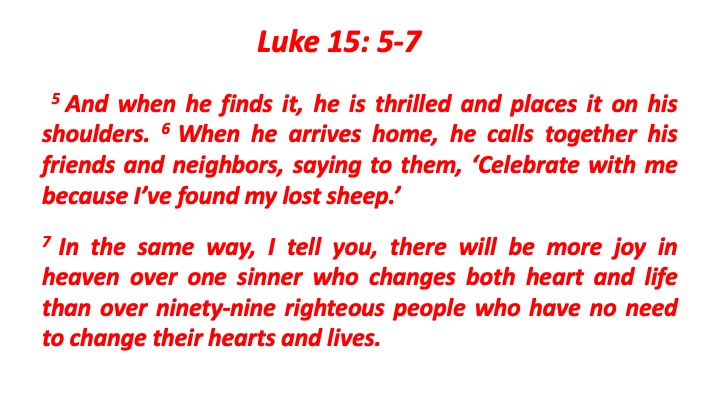
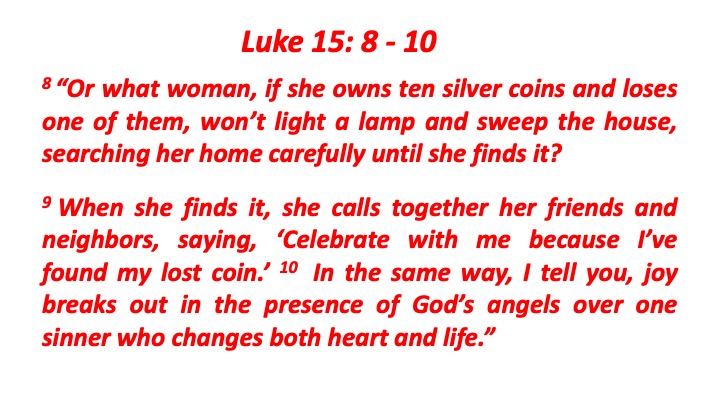
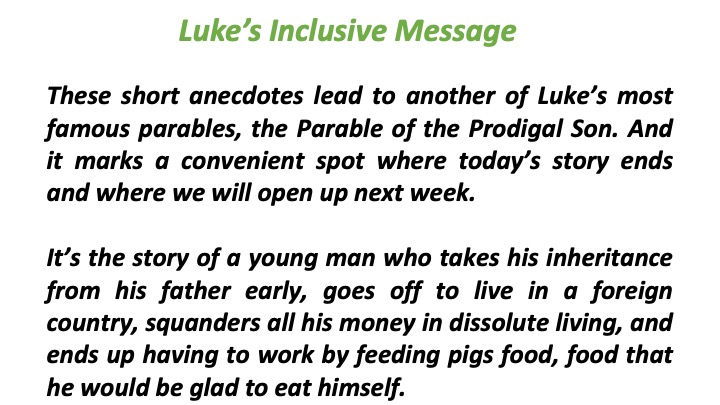
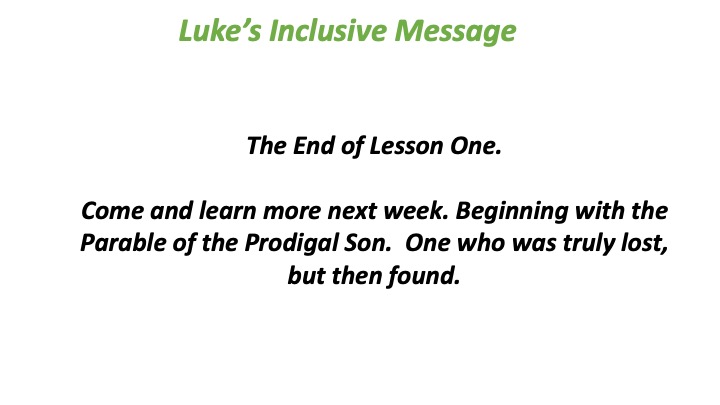
Text of Luke's Inclusive Message
TEXT FOR LUKE’S INCLUSIVE MESSAGE
Luke’s Inclusive Message
So, what is this about? Didn’t we already cover Luke when we just taught on Luke/Acts – A Gospel & History of a Movement”?
Well, yes – sort of.
But one of the things I am trying to convey this year in the various New Testament books I will be covering in that when you read any of these very complex books through different lenses is that you start to notice different things.
Luke’s Inclusive Message
And so, when we covered Luke/Acts the lens we were using was a historical one.
A combination of a Gospel of Jesus (Luke) and a following narrative (Acts) that was attempting to describe how this new movement grew through historical time.
This time we are going to return to the same Luke-Acts combination but view it through a different lens and ask what else was Luke emphasizing in this narrative.
Luke’s Inclusive Message
And what we will find is that unlike the Gospels of Matthew, Mark, and John – Luke seemed to want to tell a story about how inclusive the life of Jesus was in including all people in his ministry.
And by inclusive we mean Jesus seemed to go out of his way to include everyone in his teachings, and especially to the poor and the outcasts of society. Those who are truly “lost”.
Luke’s Inclusive Message
So – how can that be?
Maybe the New Testament is something of a Paradox.
On the one hand, it is a single book - or part of a book, the Christian Bible.
On the other hand, it is a collection of 27 different books, written by probably 16 different authors at various times and places.
Luke’s Inclusive Message
This paradox expresses itself in a variety of ways. For example, the New Testament teaches that salvation comes through Jesus, but its individual books present differing pictures of who Jesus was and what he taught.
We will see examples of that as we examine Luke/Acts again.
Luke’s Inclusive Message
And later in this year I will review Mark, in which Jesus is shown as the suffering Son of Man who provided examples of endurance and hope during a time of violence and uncertainty.
And Matthew’s Jesus resembles Moses as a teacher of a new form of righteousness.
Luke’s Inclusive Message
But for this study we will not be repeating the things we covered in “Luke-Acts – A Gospel & History of a Movement”, which was an attempt to provide a comprehensive history of the ministry of Jesus and the subsequent growth of a substantial spiritual and religious movement throughout the Roman Empire.
Instead, we will try to show that the writer of Luke-Acts also was going out of his way in his storyline to portray a very inclusive vision of what Jesus and the movement were all about.
Luke’s Inclusive Message
The message of inclusion is central to the teachings of Jesus as recorded in the Gospel of Luke and the Acts of the Apostles.
A few examples:
Jesus welcomed everyone, regardless of their social status, gender, ethnicity, or religious background. He ate with tax collectors and sinners, talked to Samaritan women, healed the sick, and provided comfort to those in need.
Luke’s Inclusive Message
Jesus spoke against discrimination and prejudice. He challenged the religious leaders who based their authority on their ancestry or adherence to strict religious rules, and instead emphasized the need for compassion and loving one's neighbor.
Jesus taught the importance of forgiveness and reconciliation. He forgave those who betrayed him and taught his followers to love their enemies and pray for those who persecuted them.
Luke’s Inclusive Message
In the Acts of the Apostles, we see how the message of inclusivity was continued by Jesus' followers. The gospel was preached to Jews and Gentiles alike, and people of all social classes and backgrounds were welcomed into the early Christian community.
Overall, the message of Jesus in Luke/ Acts is a call to love God and to love one's neighbor, regardless of their differences or circumstances. It is a message of inclusion, compassion, and forgiveness that continues to inspire and challenge people today.
Luke’s Inclusive Message
Luke has an expansive, inclusive vision of God’s salvation: Jesus came to save the rich and the poor, the powerful and the oppressed, women and men. The religious and the not so religious.
His message of repentance and forgiveness knows no national or ethnic boundaries, and applies not just to ordinary sinners, but to people who are seemingly beyond forgiveness.
Luke’s Inclusive Message
To be sure - All early Christian writings encourage charity to the poor, and they all invite poor people to receive the gospel message. But not to the extent that Luke does.
But Luke makes this a central theme of his book, and he makes his interest in the poor clear at the outset. It’s only in Luke that the baby Jesus must be laid in a manger because there’s no room in the inn.
Luke 2: 1-7
2 In those days Caesar Augustus declared that everyone throughout the empire should be enrolled in the tax lists. 2 This first enrollment occurred when Quirinius governed Syria. 3 Everyone went to their own cities to be enrolled. 4 Since Joseph belonged to David’s house and family line, he went up from the city of Nazareth in Galilee to David’s city, called Bethlehem, in Judea. 5 He went to be enrolled together with Mary, who was promised to him in marriage and who was pregnant. 6 While they were there, the time came for Mary to have her baby. 7 She gave birth to her firstborn child, a son, wrapped him snugly, and laid him in a manger, because there was no place for them in the guestroom.
Luke’s Inclusive Message
And the first visitors to visit the infant Jesus are not exotic and apparently wealthy wise men from the east, bearing gifts such as gold , frankincense and myrrh, as described in Matthew.
Rather the first people to hear the good news are instead lowly (and poor) shepherds.
Luke2: 8-10
2 After Jesus was born in Bethlehem in the territory of Judea during the rule of King Herod, magi came from the east to Jerusalem. 2 They asked, “Where is the newborn king of the Jews? We’ve seen his star in the east, and we’ve come to honor him.”
10 When they saw the star, they were filled with joy. 11 They entered the house and saw the child with Mary his mother. Falling to their knees, they honored him. Then they opened their treasure chests and presented him with gifts of gold, frankincense, and myrrh.
Luke2: 8-13
8 Nearby shepherds were living in the fields, guarding their sheep at night. 9 The Lord’s angel stood before them, the Lord’s glory shone around them, and they were terrified.
10 The angel said, “Don’t be afraid! Look! I bring good news to you - wonderful, joyous news for all people. 11 Your savior is born today in David’s city. He is Christ the Lord. 12 This is a sign for you: you will find a newborn baby wrapped snugly and lying in a manger.” 13 Suddenly a great assembly of the heavenly forces was with the angels praising God.
Luke’s Inclusive Message
And in the remainder of Luke Jesus continues to bring good news to the poor and outcast, and he tells rich people to share their possessions.
Then in Acts, the early Christians live out that vision by sharing their possessions with the poor and each other.
Luke then tell us that the believers retained no individual private property but held everything in common.
Acts 2: 42-45
42 The believers devoted themselves to the apostles’ teaching, to the community, to their shared meals, and to their prayers. 43 A sense of awe came over everyone. God performed many wonders and signs through the apostles.
44 All the believers were united and shared everything. 45 They would sell pieces of property and possessions and distribute the proceeds to everyone who needed them.
Acts 2: 46-47
46 Every day, they met together in the temple and ate in their homes.
They shared food with gladness and simplicity.
47 They praised God and demonstrated God’s goodness to everyone.
The Lord added daily to the community those who were being saved.
Luke’s Inclusive Message
And it is only in Luke where Jesus demonstrates what some scholars have called his “job description”
Jesus presents himself as a prophet, a successor to Isaiah. He’s a faithful Jew who attends the synagogue and preaches there. The Holy Spirit is upon him.
He has a special mission to the poor and oppressed. And all this fulfills Scripture.
Luke 4: 20-21
20 He rolled up the scroll, gave it back to the synagogue assistant, and sat down. Every eye in the synagogue was fixed on him. 21 He began to explain to them, “Today, this scripture has been fulfilled just as you heard it.”
And this message from Jesus appears most strongly in Luke – “I am here to preach good news to the poor, to proclaim release to the prisoners and recovery of sight to the blind, and to proclaim the year of the Lord’s favor”.
Luke’s Inclusive Message
Then in Luke Chapter 6, we find the famous beatitudes – Jesus’s list of blessings - which also appear in Matthew as part of the Sermon on the Mount.
In Matthew Jesus blesses “the poor in spirit” and “those who hunger and thirst for righteousness .”
But in Luke Jesus blesses “the poor”, and those who are “hungry”.
Luke 6: 20-23
20 Jesus raised his eyes to his disciples and said:
“Blessed are you who are poor, because God’s kingdom
is yours.
21 Blessed are you who hunger now, because you will be
satisfied.
Blessed are you who weep now, because you will laugh.
And unlike Matthew, Luke has Jesus follow his blessings with a set of “woes” for other people, the first of which is “Woe to you who are rich, for you have received your consolation.”
Luke’s Inclusive Message
In Luke Chapter 14, Jesus finds himself at a dinner party, and notices that the guests are all trying to get the best seats.
Jesus clearly states that instead of jockeying for the best places, the guests should sit at the lowest places, so that the host will move them up, rather than sit at a high place and get moved down.
Luke 14: 7-9
7 When Jesus noticed how the guests sought out the best seats at the table, he told them a parable. 8 “When someone invites you to a wedding celebration, don’t take your seat in the place of honor. Someone more highly regarded than you could have been invited by your host.
9 The host who invited both of you will come and say to you, ‘Give your seat to this other person.’ Embarrassed, you will take your seat in the least important place.
Luke’s Inclusive Message
And further Jesus tells the host that he should always invite the poor, the lame, and the blind to his dinners.
They will not return the favor, because they cannot, but the host will be blessed and will receive a reward at the resurrection.
Luke 14: 12-14
12 Then Jesus said to the person who had invited him, “When you host a lunch or dinner, don’t invite your friends, your brothers and sisters, your relatives, or rich neighbors. If you do, they will invite you in return and that will be your reward.
13 Instead, when you give a banquet, invite the poor, crippled, lame, and blind. 14 And you will be blessed because they can’t repay you. Instead, you will be repaid when the just are resurrected.”
Luke’s Inclusive Message
Interestingly, Jesus does not tell rich people to feed the hungry and poor purely out of love. There will be a reward he says.
If you take a lower seat at the dinner party, the host will give you a higher one. If you invite poor people to your own dinner, you will get your reward later.
Luke’s Inclusive Message
Another important emphasis of Jesus in Luke is that Jesus came to seek out and save the lost. That is Jesus emphasizes the need for forgiveness not just for ordinary sinners, but for those truly lost, even for those outside the religious community, people you might give up on - not just imperfect but truly lost.
Luke’s Inclusive Message
We find this idea in a series of parables in chapter 15 of Luke. When a bunch of tax collectors and other sinners gather around Jesus, some Pharisees grumble about Jesus welcoming sinners and eating with them.
Jesus responds with parables about the joy of seeking and finding what is lost - a shepherd who leaves behind 99 sheep to find one lost sheep, a woman who lights a lamp and sweeps her house to find a single lost coin. These examples emphasize the effort that goes into seeking the lost.
Luke 15: 1-4
15 All the tax collectors and sinners were gathering around Jesus to listen to him. 2 The Pharisees and legal experts were grumbling, saying, “This man welcomes sinners and eats with them.”
3 Jesus told them this parable: 4 “Suppose someone among you had one hundred sheep and lost one of them. Wouldn’t he leave the other ninety-nine in the pasture and search for the lost one until he finds it?
Luke 15: 5-7
5 And when he finds it, he is thrilled and places it on his shoulders. 6 When he arrives home, he calls together his friends and neighbors, saying to them, ‘Celebrate with me because I’ve found my lost sheep.’
7 In the same way, I tell you, there will be more joy in heaven over one sinner who changes both heart and life than over ninety-nine righteous people who have no need to change their hearts and lives.
Luke 15: 8 - 10
8 “Or what woman, if she owns ten silver coins and loses one of them, won’t light a lamp and sweep the house, searching her home carefully until she finds it?
9 When she finds it, she calls together her friends and neighbors, saying, ‘Celebrate with me because I’ve found my lost coin.’ 10 In the same way, I tell you, joy breaks out in the presence of God’s angels over one sinner who changes both heart and life.”
Luke’s Inclusive Message
These short anecdotes lead to another of Luke’s most famous parables, the Parable of the Prodigal Son. And it marks a convenient spot where today’s story ends and where we will open up next week.
It’s the story of a young man who takes his inheritance from his father early, goes off to live in a foreign country, squanders all his money in dissolute living, and ends up having to work by feeding pigs food, food that he would be glad to eat himself.
Luke’s Inclusive Message
The End of Lesson One.
Come and learn more next week. Beginning with the Parable of the Prodigal Son. One who was truly lost, but then found.